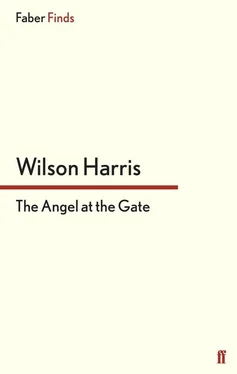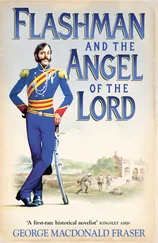There were diminutive artefacts on the wall, artefacts of gods, goddesses, processions, the Himalayas. All were from India where Marsden had worked as a young man. One carving — an Indian sailor — Mary now named after her own father. Mack the Knife. He stood just under Gandhi’s feet, a sharp-featured young man of twenty-two, a sharp-featured mask. Marsden, Mary knew, accepted the inevitability of the name and pitted himself — in the diminutive ocean of the bath — against the terror of the shark associated with Knife. Another carving, an Indian child of twelve, her brow wreathed in flowers, Mary named Lucy Brown, It was a common enough name but it seemed uncommonly appropriate in this instance, in tune with Mack the Knife.
Stella leaned forward suddenly. “Here’s the boat, Mary, that sails in the house.” She laughed. “I shall go aboard now for Proudhon Utopia. When the boat returns you will go with Marsden on a flying trip to India.”
“Is that … is that …” Mary faltered, “Joseph’s departure of which you spoke? Shall I too…?”
“ Father Marsden,” said Stella severely, frowning on the use of Marsden’s Christian name, “will return with you. But he is to make another trip in a box that’s a planet.”
“A box that’s a planet?” Mary was bewildered.
“You will see,” Stella cried. “Planet Bale is composed of a simple box. You could fill it with silks or dates if you wished. That’s when he’ll really go.” She stopped speaking, pushed the boat off and was away.
After a moment that seemed an eternity the boat returned. It was Mary’s turn to step with Marsden on to the ship.
*
The minute hand that struck, when Stella died, to stay the world, struck again to set it in curious motion. And Marsden demonstrated that Stella’s and Mary’s personal memories — Mack the Knife, Lucy Brown, etc. — possessed a motionless yet moving thread in global memory, sarcophagus-globe. Personal symbol was a rhythmic dimension of global wedding and funeral. Personal minute hand existed in the global clock to read events far and beyond oneself and to delineate a pattern of inimitable divisions of pain, of affection, of subtlety, of wisdom, of cunning. Those divisions were part of an inscrutable, sometimes terrifying law of love.
The sea of the bath undulated and Mary perceived the fate of the ship on which she sailed that was manned by divine shark — Mack the Knife — and divine, non-violent personality, Mahatma Gandhi. A strange pair, she thought; she wanted to close her eyes and vanish into Marsden’s cabin, into the darkness of eerie encounter with a holy man, a god, a priest. But she felt that Stella’s riddle had not yet achieved its climax.
The ship drew them through an upset sea to the continent on the other side of the bath, a map of India, where they landed. They set out for the city of Mysore with its golden turret and its children in the marketplace like birds, divine birds with wounded eyes, half-eaten eyes that were closer to Mary’s flesh-and-blood than to Stella’s uneaten, virgin apparition when she had crossed from the hospital into Mary’s arms. Then they progressed to their destination, a village some two hundred miles or so from Mysore on the bank of a river (by the scale of sprinkled rain from the bath on the map on the wall). There the pain of the law, the divisions of the law, began to cut into Mary’s flesh.
A wedding procession was emerging from a temple in the village. It was crystal clear in diminutive artefact on extended parallel or horizon drawn from the map. Mary kept her eyes glued to that procession as the law seemed to mount her in the bath. Mack the Shark or Knife was the bridegroom, Lucy (twelve years old) the child-bride. Mary felt promissory stab of pain, promissory insertion of the phallus of the sun that covered Mack’s knife.
How had such a priestly metamorphosis occurred? How had the knife been fired, yet blunted, to achieve a climax of the spirit of pain, spirit of creation, a violation that was no violation, a riddling penetration?
Marriages between child-brides and adult men were forbidden by political and legal statute in modern India but ancient and archaic law of tradition (feudal Europe in modern India it seemed to Marsden) died hard. The mutation of knife into phallus of the sun lay less in legal strictures and punishments and more in the genius of the creator-mind to disguise itself within distinctions of the pain of the law and judgement-day scenarios. Thus it was that the Indian sailor-shark found himself seized by judgement-day wedding guests not to be castrated or sterilized or abused (though that threat of judgement was imminent in the logic of karma, the logic of past deeds for which one is punished in present lives), seized not to be castrated or sterilized or abused for the projected rape of a child but to be embodied with the mask of a god. Sick shark. Sick sailor, yet curative genius of love. The mask of Gandhi, the very one in the portrait in Marsden’s Angel Inn, was placed upon Knife to council him against rape of a child.
Mary recalled the divinity of the cat Stella had seemed as she crossed the road. Mack the Knife seemed now — as he clung to sarcophagus-globe in Indian artefact — no longer a shark but invested with the stigmata of the wounded children of Mysore, Gandhi bird-beaked nose and an almost comical pair of glasses stuck not upon blind eyes within the intimate flesh of children but high on his brow where they gleamed with the golden sun, phallic gold, phallic pole of the sun that threatened to lift Knife’s skull into the heavens, Knife’s cruel brain, should he persist with cunning rape of innocence.
The degree in which Knife was torn and translated into the music of pain was abundantly clear, Mary felt. He was torn between brain aloft in the heavens and the mystery of love higher still, in more remote womb of space or heavens still; higher still in order to regress into earth and into every room, shelter, bed, house, cave, forest, bath where Marsden’s beard dripped with the tears of the distraught child-in-the-woman he held in his arms. She had rushed in upon him and he had consoled her without violation.
The mask of Gandhi high on the wall blended into a carving by the Christian carpenter Joseph. Indian Lucy was destined to die as a young woman in India. Khublall was the actual name of the sailor to whom Mary had given her father’s name Mack the Knife. It was written in faint Sanskrit under the carving on the bathroom wall. Khublall would mourn Lucy to the end of his days. Marsden was destined to die in London. Mary would mourn him as her everlasting Joseph, in all vicissitudes of lust and pain, to the end of her days. More about Khublall would emerge — Mary promised — as her automatic book moved, stopped, moved on.
*
Judgement-day paradoxes lay in every foundation of human paradise. Mysore Gandhi existed in Angel Inn, Stella in Proudhon Utopia, Lucy in Khublall’s child-bride. They would never entirely vanish. They would ebb forwards, flow backwards. A tide of reversed transference of every nuance of passion from one person back to the other, a tide of projections upon one from the other running back from one to the other, gleamed everywhere. The mask of Gandhi transferred itself into reverse multi-faceted Joseph and vice versa to encompass judgements of the law beyond personal dogma or wall of bias. The intriguing potential for epic, for comedy, for tragedy, of creator-brain in creatress-womb implied reversibles that Mary had not yet fully grasped. She sought to begin to do that now by descending into inchoate, human paradise as the ship on the bath returned to dock in London.
The compression of an ocean into a bath, a ship into minute-hand sail in the clock of the globe, invoked a new scale into Mary’s epic, tragic, comic book. The scale of the diminutive. No gigantic pretensions. Infinity of hope. Seed of hope. Endangered seed of life everywhere. And so, as a consequence, her fears were enlarged against a mere seed. And yet ominous and enlarged as her terrors appeared at times to become, the conception of the diminutive was in itself paradox, protection and defence. It was the ground of humility — not only that, it was above all an acceptance of miracle in the oldest and the youngest creatures. Age was renewal, age was potency, despite its closeness to death; and the smallest, youngest creature was a measure of deity’s skill in random evolution. Her three-year-old son was the embodiment of miracle, the wonder of the ages.
Читать дальше












